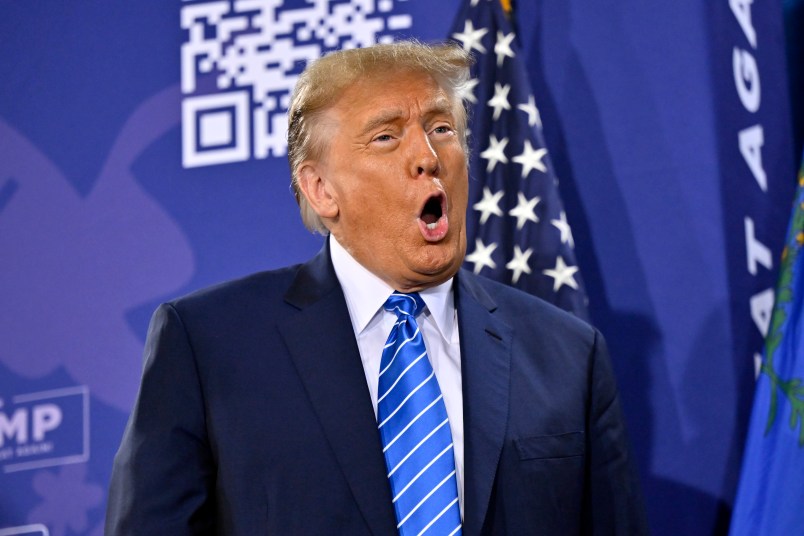The Supreme Court will hear Donald Trump’s claim that he is immune from prosecution over his effort to stay in power after losing the 2020 election.
Per an order issued on Wednesday, the court will hear arguments in the case the week of April 22.
The move keeps the case frozen at the district court level, and threatens to upend a unanimous ruling from a D.C. Circuit appellate panel holding that prosecutors were well within their rights to prosecute a former President, and that Trump’s efforts to reverse his loss were well outside the scope of his official duties.
By the normally plodding pace of high-level appellate battles, the court took Trump’s case on a fast timeline.
But in practice, the court’s decision will add months of delay to the Trump trial, initially scheduled to begin in March.
The decision is on an expedited schedule. But it’s not as expedited as the other recent, high-stakes Trump case to go before the court: in the 14th Amendment disqualification battle, the court scheduled oral arguments one month after agreeing to hear the matter.
The D.C. Circuit issued its ruling against Trump on Feb. 6, giving Trump several days to file an appeal before the clock on the lower court restarted. Special prosecutor Jack Smith filed his reply to Trump’s petition for writ on Feb. 14; it’s been two weeks since that filing.
It’s a momentous decision which threatens to upend a D.C. Circuit opinion widely seen as settling the question of whether Trump stood above the law. The court’s decision to take the case means that at least five justices were willing to grant a stay of the lower court’s decision.
Trump has argued that he cannot be prosecuted over Jan. 6 for two reasons: that the actions with which he was charged in the indictment fell under the umbrella of his official duties as president, and that he can’t be prosecuted over the same conduct for which he was acquitted in the February 2021 impeachment trial.
The Supreme Court only took up the first question, phrasing it as follows: “Whether and if so to what extent does a former President enjoy presidential immunity from criminal prosecution for conduct alleged to involve official acts during his tenure in office.”
No justice of the court signed the order. It noted that the court was not “expressing a view on the merits” of the case. Taking the case required at least four justices to vote to do so. The order could be interpreted as focusing on a complicated question that the D.C. Circuit largely avoided in its ruling: whether Trump’s actions before Jan. 6 were “official acts,” and therefore within the realm of immunity.
Until being frozen by the higher courts, the D.C. Jan. 6 case had been seen as presenting the greatest pre-election threat to Trump. U.S. District Judge Tanya Chutkan for the District of Columbia, the lower court judge, had been moving the matter along at a speedy pace, at times recognizing the core issue: trying a former president and presidential candidate for attempting to overturn an election result before the next election could take place.
But at the appellate level, things began to slow down. The D.C. Circuit issued a comprehensive refutation of Trump’s claim that he’s above the law; it took nearly a month to get there. The Supreme Court took the case on an expedited manner; it could still delay the trial until dangerously close to Election Day.
With the Mar-a-Lago records case likely poised for delay and the Fulton County, Georgia, RICO prosecution mired in issues ranging from the procedural to the salacious, only the Manhattan hush money payments prosecution is set to move forward. That case will begin jury selection next month.
The court ruling comes after the DOJ already asked the court to intervene in the immunity question in December. The court declined, adding months in which the D.C. Circuit deliberated, only for the high court to take up the matter.
Read the order here:







uffda
Why the wait
Does Clarence need more time to assess the cash value of his verdict?
……Why?!
Are they actually considering giving Trump full immunity? Or is this just their way of intentionally delaying the Jan 6 trial?
This court is an abject failure and an utter disgrace.
Dictator Trump will do away with the Supreme Court.
They do know that, right?